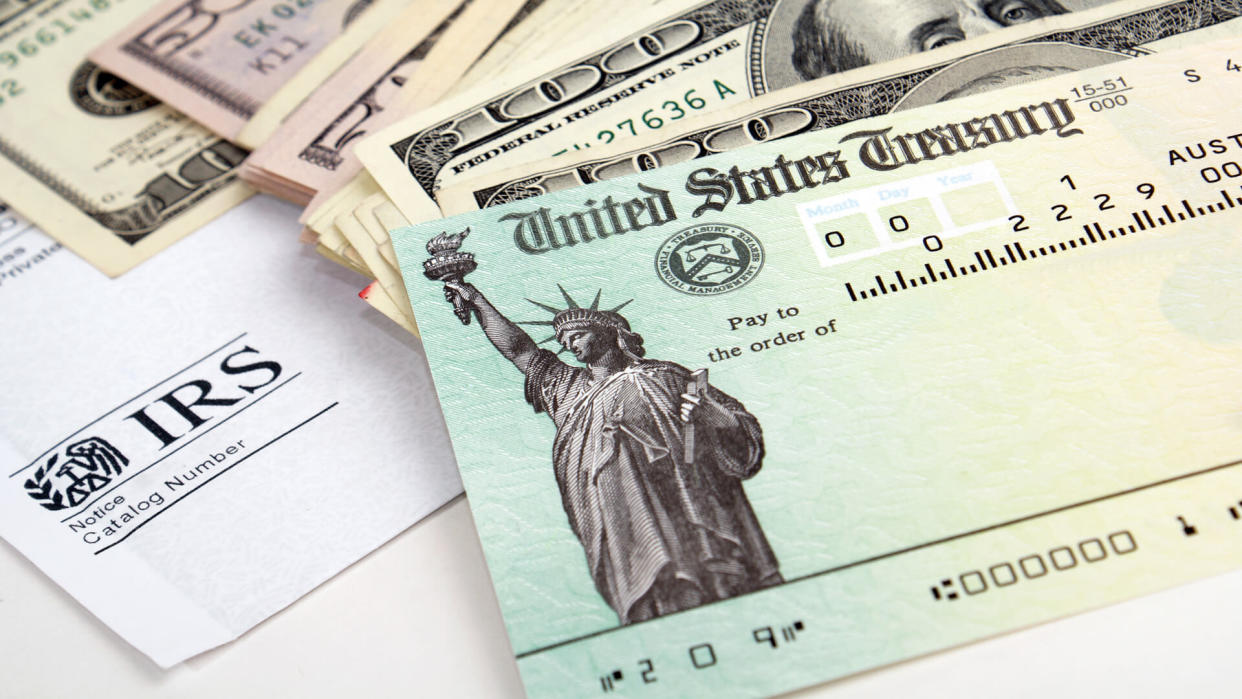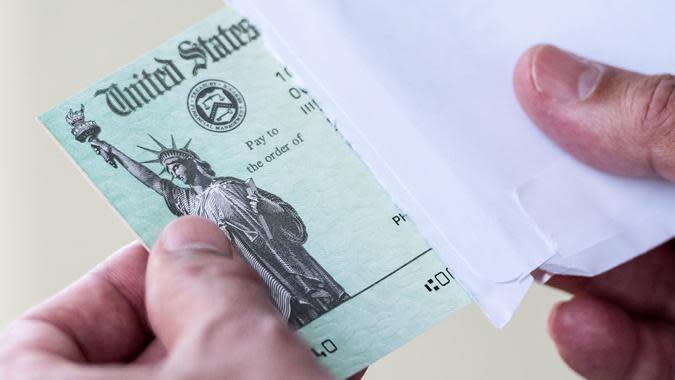Don’t Fall For One of the ‘Dirty Dozen’ Tax Scams

Nobody likes paying taxes. But given the choice between paying taxes and getting cheated out of your money by fraudsters, well, most people would pick the taxman over the criminal. Yet that doesn't stop thousands of people from forking over millions of dollars in hard-earned wages to con artists.
Next: This Secret IRS Loophole Lets You Reduce Your Retirement Taxes
Read: 3 Signs You're Serious About Raising Your Credit Score
And your tax return is one area where spotting scams is made that much harder by the complexity of the tax code. Many Americans aren't confident in their understanding of how the IRS works or how their taxes are collected, so there's ample opportunity to take advantage of those knowledge gaps to create a scheme that works.
Fortunately, the IRS produces a list of the "Dirty Dozen" tax schemes every year, detailing the numerous tax scams that taxpayers should keep an eye out for when navigating their taxes. And if you can spot the signs of a scam early, it's that much easier to avoid the pitfalls that have ended up costing so many other tax scam victims before.

1. Use of Charitable Remainder Annuity Trust (CRAT) to Eliminate Taxable Gain
Charitable remainder trusts, or CRATs, are irrevocable trusts that allow taxpayers to donate assets to charity and draw annual income for life or for a specific time period of time.
In this "dirty transaction", property is transferred to a CRAT. Taxpayers claim the transfer of the assets to the CRAT, which results in a "step-up" in tax basis to fair market value -- as though the property had been sold to the trust. Next, the CRAT sells the property but does not recognize the gain because of the claimed "step-up." The CRAT then uses the proceeds to buy a single premium immediate annuity (SPIA). The beneficiary claims only a tiny portion of the annuity received from the SPI as taxable income. The beneficiary regards the remaining payment as non-taxable ROI.
Related: Reduce Your Social Security Tax Bill Using These Tips
Capital Gains Tax on Stocks: What It Is and How To Minimize It

How To Avoid (CRAT) to Eliminate Taxable Gain
Use of a CRAT to eliminate taxable gain is a blatant misapplication of the tax rules for CRATs. Chances are, this isn't something you do by mistake. To keep within the bounds of the law, do the following with CRATs:
Do not pay personal expenses with them.
Do not borrow from them.
Do not change the character of payments from the trust from ordinary income or capital gains.
Do not use loans, forward sales of assets or other financial schemes to hide capital gains or income in them.
Don't inflate the basis of an asset to its market value when the asset was transferred into them, instead of recording the asset at carryover basis, or the basis in the hands of the donor, to illegally minimize or eliminate capital gains or regular income.
Do not omit or fail to account for the sale of any assets of them.
Don't mischaracterize distributions of ordinary or capital gain income as distributions of corpus.
Do not give non-charitable beneficiaries any payment beyond the prescribed annual income payments, called self-dealing.
Don't transfer the charitable remainder interest of them to an organization that isn't a qualified tax-exempt organization.
Don't make an upfront cash payment to a charitable beneficiary in lieu of the remainder interest.
Take Our Poll: Who Has Given You the Best Money Advice You Have Ever Received?

2. Maltese (or Other Foreign) Pension Arrangements Misusing Treaty
This is another rather blatant scheme to evade paying taxes. With this one, U.S. taxpayers attempt to avoid U.S. tax by making contributions to certain foreign individual retirement arrangements in Malta, or other foreign countries. Usually local law allows contributions in a form other than cash or doesn't cap the amount of contributions in relation to income earned. By building out a "pension fund" for U.S. tax treaty purposes, the taxpayer intentionally misconstrues the relevant treaty to improperly claim an exemption from U.S. income tax on earnings in, and distributions from, the foreign arrangement.

How To Avoid Maltese (or Other Foreign) Pension Arrangements Treaty Misuse
You'd have to go out of your way to "fall prey" to this sly maneuver. Just don't seek to misconstrue the provisions of an income tax treaty of the U.S to avoid income tax. It's as simple as that.

3. Puerto Rican and Other Foreign Captive Insurance
Coming in at no. 3 on the "Dirty Dozen" is Puerto Rican and Other Foreign Captive Insurance. This occurs when a U.S based owner of closely held entities participates in a purported insurance arrangement with a Puerto Rican or other foreign corporation with cell arrangements or segregated asset plans in which the U.S. based owner has a monetary interest. The U.S. based owner claims deductions for the cost of "insurance coverage" touted by a carrier, which reinsures the "coverage" with the foreign corporation. The traits of the purported insurance arrangements usually include one or more of the following:
Implausible risks covered
Non-arm's-length pricing
Lack of business purpose for entering into the arrangement.The problem here is that there is no risk distribution actually happening, which makes it an abusive tax transaction.

How To Avoid Puerto Rican and Other Foreign Captive Insurance Scams
This one is a bit complex and probably most taxpayers won't find themselves in a position to worry about it unless they're a business purchasing insurance to protect themselves from various kinds of risk. It's best to search on the commercial market for insurance rather than trying to trim costs by looking for cheaper, more remote alternatives.
$2,000 Quarter? Check Your Pockets Before You Use This 2004 Coin

4. Monetized Installment Sales
This is another complicated scenario that most Americans won't find themselves just walking into; nevertheless they're prevalent enough to make the IRS' "Dirty Dozen" list: monetized installment sales. Typically, a taxpayer acknowledges income on their tax return from selling a property in the year when payment is received. An "installment sale" is a sale that the seller receives at least part of the payment for after the end of the year of sale. When that happens, the seller's income for that year is the payment received as a share of the total contract price.
Now, through a monetized installment sale, income recognition can be stretched much further than what is proper. It's a trick that sees the taxpayer/property seller get the full market value of the property in cash at the time of filing, and defer capital gains taxes for 30 years.
These abusive tax strategies are multifaceted, and typically involve five parties: the property seller, an intermediary (promoter), a buyer, a lender and an escrow agent.

How To Avoid Monetized Installment Sales
Monetized installment sales complicated schemes and again, not something you just walk into. That said, it's possible to get sucked into these hustles, which are sold by aggressive promoters who don't care what the law says. If you are considering an M453 transaction, as monetized installment sales are called in the finance world, get out before the IRS cracks down on you.

5. COVID-19 Fraud
These are scams that use COVID-19 relief programs to get personal info. They include economic impact payment and tax refund scams, unemployment fraud leading to inaccurate taxpayer 1099-Gs, fake employment offers posted on social media and fake charities.

Economic Impact Payment and Tax Refund Scams:
Though the federal government did not issue any stimulus checks in 2022, a number of states provided relief in various form. Scammers are after this money, known as Economic Impact Payments (EIPs) and the IRS is warning taxpayers to be vigilant. Identity thieves try to manipulate EIPs, as well as tax refunds, by sending fake text messages, calling and/or emailing asking for bank information, or requesting recipients to click a link or verify data.

How To Avoid Economic Impact Payment and Tax Refund Scams:
Remember, the IRS won't initiate contact by phone, email, text or social media asking for Social Security numbers or other personal or financial information related to EIPs or tax refunds. Also be alert to mailbox theft. Routinely check your mail and report suspected mail losses to postal inspectors. Bear in mind that the IRS has by now issued all EIPs. If you are missing a stimulus payment or got less than the full amount, you may be eligible to claim a Recovery Rebate Credit on their 2020 or 2021 federal tax return.

Unemployment Fraud Leading to Inaccurate Taxpayer 1099-Gs
The pandemic led to mass job loss, which created a spike in unemployment claims. Though the situation has since dramatically improved, and the unemployment rate is presently low, the IRS is still navigating issues that stemmed from the crisis. Scammers took advantage of the pandemic upset in the labor market by filing fraudulent claims for unemployment compensation using stolen personal information of individuals who had not filed claims. Payments made on these fraudulent claims went to the identity thieves instead of the people they were impersonating. This is yet another form of identity theft.
If you're a victim, you'll receive a Form 1099-G reporting unemployment compensation for monies you didn't receive.
More: How To Avoid Paying Taxes Legally -- and the 11 Craziest Ways People Have Done It

How to Avoid Unemployment Fraud Leading to Inaccurate Taxpayer 1099-Gs
The best way to stay safe from this scam is to practice identity theft safety tips. If you find yourself a victim, the IRS urges you to contact your appropriate state agency for a corrected form. If a corrected form cannot be obtained in time for a timely tax return, taxpayers should complete their return claiming only the unemployment compensation and other income they actually received.

Fake Employment Offers Posted On Social Media
Fake job postings have flooded social media since the onset of the pandemic -- and they're getting trickier to see through. These fake posts lure job seekers to provide their personal financial information. This creates enhanced tax risk for people because this information can be used to file a fraudulent tax return for a fraudulent refund, etc.

How To Avoid Fake Employment Scams on Social Media
Social media can be a great way to find out about new jobs, but bear in mind that the IRS, or your bank, for that matter, will never ask you for financial information using social media. If you start chatting with someone on a social platform and it winds up in a place where your financial details become a part of the conversation, bolt.

Fake Charities
Using people's generosity to take advantage of them is pretty low, but that doesn't stop some criminals from doing it. Luring you in with a cause you hold dear and the promise of a tax deduction, fake charities will convince you to hand over cash and then try to claim it on your taxes. Or, if you're really unlucky, they might even use their front as a means to steal personal information that they can then use to commit further fraud or steal your identity.

How To Avoid Fake Charities
The IRS offers a search feature called Exempt Organizations Select Check to determine if a charity is legitimate or not, so you can run any group through that to confirm it's legit. You should also ask for their Employer Identification Number (EIN), which any real organization should provide without complaint. Also watch out for a group that is using a name only slightly changed from a well-known organization while also mimicking the look and feel of the group, and never send cash via mail or give out your credit card information to someone contacting you to solicit a donation.

6. Shady Tax Debt Settling Service
These scams are advertised as debt settling services for unsuspecting tax filers. The IRS identifies OCI mills, ghost preparers and inflated refund claims as the main ones to look out for.

Offer in Compromise 'Mills'
Offer in Compromise or OIC "mills," make claims that seem too good to be true -- and they are. Usually you'll find them running ads in your local paper. They tend to go on about how they can settle a person's tax debt for pennies on the dollar. What often ends up happening is that the taxpayers pay the OIC mill a fee to get the same deal they could have gotten on their own by working directly with the IRS. Though these "mills" are a year-round problem, they up the ante during tax season.

How To Avoid OIC Mills
When deciding whether to engage a tax resolution company, do your homework to determine whether complaints have been filed against the company by others. You can find this out by checking out reviews and doing some detective work on Google. Also, when you consult with a tax resolution company to handle your matter, make sure to ask them up front for a schedule of fees and to be cautious of big promises.

Ghost Preparers
There's no shortage of people out there who call themselves tax professionals. Unfortunately, some of them aren't so professional. There is such a thing as "ghost preparers" -- preparers who won't sign the tax returns they prepare. For e-filed returns, the "ghost" will prepare the return, but refuse to digitally sign as the paid preparer. Essentially, they're not finishing the job they started and they're leaving the taxpayer in a lurch. By law, anyone who is paid to prepare, or assists in preparing federal tax returns, must have a valid Preparer Tax Identification Number (PTIN). Paid preparers must sign and include their PTIN on the return.

How To Avoid Ghost Preparers
Make sure, before you retain a tax preparer, that they have a valid Preparer Tax Identification Number (PTIN). Also, do your research on them to be sure they have glowing reviews.

Inflated Refund Claims
Plenty of shady preparers or even just criminals posing as preparers will suck you in with claims that they can provide huge refunds that will dwarf whatever your CPA is telling you is possible. Once they've convinced you to sign up with them, they will dupe you into making fake claims for benefits or credits, potentially even filing a false return or stealing your refund without telling you.

How To Avoid Inflated Refund Claims
These scams often target people without a filing requirement -- seniors or people with low incomes -- so if you're in that group, be especially cautious if someone promises you a chance to file and score big refunds. However, even if you're not, remember that if it sounds too good to be true, it probably is. If your preparer is promising a refund that's well beyond what you normally get, the odds are pretty good they're either doing so to hook you in or they intend to break the law to get there. Research your preparer carefully and stick to someone with a track record you can trust.

7. Suspicious Communications
Every form of suspicious communication -- be it an offbeat email, a weird text, an creepy social media message -- is designed to trick, surprise, or scare you into immediate action. The IRS warns taxpayers to be on the lookout for suspicious activity across four common forms of communication: email, social media, telephone, and text messages. All the time, people are tricked into providing sensitive personal financial information, which can be used to file false tax returns and tap into financial accounts, among other criminal acts.

How to Avoid Suspicious Communications Scams
Remember that the worst thing you can do, from a scammer's perspective, is pause and take stock of the situation. That's why they will always have an urgency in their message, be it in a text, email, social media post or good old-fashioned phone call. Think twice, be patient, and remember that none of these means of communication are those used by the IRS.

8. Spear Phishing Attacks
Criminals attempt to steal client data and tax preparers' identities to file fraudulent tax returns for refunds by spear phishing, a kind of email attack method that uses the IRS logo for the appearance of authenticity.
A recent spear phishing email used the IRS logo and a variety of subject lines such as "Action Required: Your account has now been put on hold" to steal tax professionals' software preparation credentials. The scam email contains a link that if clicked will send users to a website that shows the logos of several popular tax software preparation providers. Clicking on one of these logos will signal a request for tax preparer account credentials.

How to Avoid Spear Phishing Attacks
Do not respond or take any of the steps outlined in an email from "the IRS". It is not from them. Additionally, the IRS has observed similar spear phishing emails claiming to be from "tax preparation application providers." Even when working with your CPA, don't provide any sensitive information over email without confirming that they're the ones receiving it. Any CPA worth their salt will use a secure, encrypted messaging platform. Make sure that yours does.

9. Concealing Assets in Offshore Accounts and Improper Reporting of Digital Assets
Back to the schemes you don't just accidentally fall into: concealing assets in offshore accounts and improper reporting of digital assets. These are complex international tax avoidance schemes and cross-border transactions that are enacted by individuals and entities with an international footprint. Thanks to a spike in international tax and money laundering crimes, the IRS has heightened its vigilance of this type of evasion and added it to its "Dirty Dozen" list.
Over the years, a multitude of people and businesses have been found to be evading U.S. taxes by attempting to hide income in offshore banks, brokerage accounts or nominee entities. They then access the funds using debit cards, credit cards, wire transfers, etc. Some dubious players have used foreign trusts, employee-leasing schemes, private annuities and structured transactions in an attempt to hide the true owner of accounts or insurance plans.
U.S. persons are taxed on worldwide income, so it really doesn't matter where you (or the money) is located in order for it to be taxable. Thus, simply because money is kept in an offshore account does not put it out of reach of the U.S. tax system. American citizens are required, under penalty of perjury, to report income from offshore funds and other foreign holdings.

How to Avoid Concealing Assets in Offshore Accounts and Improper Reporting of Digital Assets
Again, this isn't a scheme you find yourself in all of a sudden, by accident. It takes intention and careful planning. That said, the proliferation of digital assets across the world in the last decade or so has created tax administration challenges regarding digital assets. Shady promoters continue to perpetuate this myth and make assertions that taxpayers can easily conceal their digital asset holdings. If you come across a promoter telling you that you can hide your money from the government by putting it overseas somewhere, run. You'll save yourself from serious trouble with the IRS.

10. High-Income Individuals Who Don't File Tax Returns
High-income individuals who don't file tax returns are a big problem with the IRS. It tends to happen with people earning more than $100,000 a year.
If you're making good money and thinking you're for some reason above paying taxes, think again. And if you're broke, keep in mind that it is more advantageous to file an accurate return on time and set up a payment plan if needed than to not file. The Failure to File Penalty is generally 5% of the unpaid taxes for each month or part of a month that a tax return is late. The Failure to Pay Penalty is generally 0.5% of the unpaid taxes for each month or part of a month the tax remains unpaid.
If a person's failure to file is determined to be fraudulent, the penalty generally increases from 5% per month to 15% for each month or part of a month the return is late, with the maximum penalty generally increasing from 25% to 75%.

How to Avoid Being a High-Income Individual Who Doesn't File a Tax Return
The answer to avoiding being a high-income individual who doesn't file a tax return is simple: File a tax return like everybody else!

11. Abusive Syndicated Conservation Easements
In syndicated conservation easements, promoters take a provision of the tax law that allows for conservation easements and manipulate it by using inflated appraisals of undeveloped land (or, sometimes, the facades of historic buildings), and by using partnership arrangements devoid of a legitimate business aim. These are abusive arrangements that play the tax system with grossly inflated tax deductions and are designed to line the promoters pockets with high fees.

How to Avoid Abusive Syndicated Conservation Easements
Avoid becoming trapped in these deals sold by unscrupulous promoters by once again recognizing that if something sounds too good to be true, then it probably is. Recognize that you can risk severe fines for engaging in syndicated conservation easements. And you'll likely be caught, as the IRS has been upping its manpower over the last five years to weed out these schemes.

12. Abusive Micro-Captive Insurance Arrangements
In abusive "micro-captive" structures, promoters, accountants, or wealth planners get owners of closely held entities to participate in schemes that lack many of the key attributes of insurance.
These insurance coverages may "insure" implausible risks, fail to match genuine business needs or duplicate the taxpayer's commercial coverages. Additionally, the "premiums" paid under these arrangements can be excessive and are used to evade the tax law.

How to Avoid Abusive Micro-Captive Insurance Arrangements
To best avoid these schemes, thoroughly vet your promoters, accountants, and.or wealth planners. Make sure you know the ins and outs of any coverage you're buying. Additionally, bear in mind that the IRS has stepped up enforcement against abusive micro-captive transactions, so if you're ensnared in one of these arrangements, get out or watch out.
More From GOBankingRates
Nicole Spector and Amen Oyiboke-Osifo contributed to the reporting for this article.
This article originally appeared on GOBankingRates.com: Don’t Fall For One of the ‘Dirty Dozen’ Tax Scams
